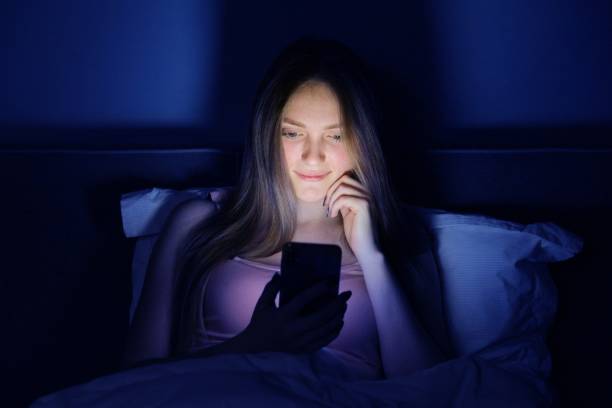In a world where our phones are the first thing we see when we wake and the last thing we touch before sleep, the line between rest and constant connection has nearly disappeared. The quiet hours of the night, once reserved for dreaming and recovery, have become another battleground for attention. A new study from the University of Bristol, published in Scientific Reports, reveals an unsettling truth: posting on Twitter — now known as X — during the night is linked to worse mental well-being.
This isn’t simply about being online late. The research found that nighttime tweeting explained almost 2% of the variation in participants’ mental well-being. That may sound small, but it’s comparable to the negative impact of behaviors like binge drinking or smoking marijuana, based on previous studies. The implications are clear — our late-night social media habits are not harmless distractions; they may be quietly eroding our mental health.
How Nighttime Tweeting Disrupts the Mind
Researchers suggest that using Twitter late at night doesn’t just take time away from sleep — it changes how we sleep. When the mind is engaged in rapid scrolling, reading emotionally charged content, or posting our thoughts to the world, it can trigger physiological arousal. That means the brain stays alert when it should be winding down.
Screens emit blue light that suppresses melatonin, the hormone responsible for sleep, delaying our natural sleep cycle. Beyond the light itself, the act of online interaction — likes, replies, and notifications — creates microbursts of excitement or anxiety that keep us awake. Over time, this sleep disruption leads to reduced sleep quality and quantity, both of which are strongly linked to poor mental health outcomes.
Interestingly, while nighttime tweeting showed a weaker relationship with depression and anxiety than with general mental well-being, those links became stronger when the results were analyzed by age and sex. Younger users and women appeared to be more affected — possibly due to higher engagement levels and emotional investment in online interactions.
The Sleep Problem Behind the Screens
Sleep is the foundation of mental stability, memory, and emotional regulation. When we compromise it, everything from mood to motivation suffers. The Bristol study adds to a growing body of evidence suggesting that our digital habits are interfering with this essential biological process.
According to a 2022 YouGov survey, 74% of U.K. adults keep their phone in the bedroom at night, and 26% admit they would check it if they woke up in the middle of the night. The phone has become both a comfort object and a culprit — a constant companion that connects us but also prevents us from disconnecting.
Even a brief glance at notifications can jolt the brain into wakefulness, restarting a cycle of engagement and stimulation. Over time, this erodes sleep hygiene and, consequently, mental health. The result? A society more connected than ever, yet increasingly restless and fatigued.
Toward a Healthier Digital Night
The findings from this study don’t simply expose a problem — they highlight an opportunity for change. The researchers argue that improving nighttime digital behavior will require both personal awareness and systemic action.
Social media platforms themselves could play a role. Some have already begun taking small steps. For example, TikTok introduced a “Wind Down” tool earlier this year, which plays calming videos to encourage users to log off at night. Such features show promise in reshaping how platforms engage with users during late hours.
However, researchers like Daniel Joinson, the lead author of the Bristol study, suggest that more proactive design changes and educational campaigns are needed. “While social media is often treated like a monolith,” he explains, “its impact on mental health will depend on the exact behaviors the user performs and the experiences they have on these platforms. Our paper highlights the potential harm of a very specific behavior: nighttime content posting.”
Joinson’s words underscore an important distinction — not all social media use is harmful. It is the timing and manner of use that often determine its psychological effects. Platforms could introduce design elements that discourage nighttime posting or nudge users toward digital rest. Meanwhile, educational initiatives can help younger, more vulnerable users recognize when their nighttime scrolling is crossing into unhealthy territory.
A New Era of Data-Driven Mental Health Research
What makes the Bristol study remarkable is its use of real-world data. Instead of relying on self-reported habits, the research team accessed participants’ actual Twitter data — with consent — to analyze precisely when they were posting. This approach allowed them to identify direct patterns between posting times and mental well-being, something earlier studies struggled to capture.
The researchers analyzed over 18,000 tweets from 310 adults aged 18 to over 60. Mental health was measured using validated questionnaires such as the Short Mood and Feelings Questionnaire (SMFQ), which provided a nuanced picture of emotional states rather than simple “depressed” or “not depressed” labels.
By combining behavioral data with psychological assessments, the team uncovered subtle but meaningful patterns. People who tweeted more during late-night hours consistently showed lower overall well-being scores. Importantly, these findings held even after accounting for other factors such as age, gender, and general social media use.
The Context of a Digital Pandemic
It’s important to note that the data for this study was collected during the COVID-19 pandemic — a time when social media use and mental health patterns were both profoundly affected. Isolation, uncertainty, and the absence of in-person interaction led many to seek connection online, especially during late-night hours when anxiety and insomnia often peak.
In that sense, nighttime tweeting during the pandemic became both a coping mechanism and a symptom — a way to connect when the world felt disconnected. The researchers acknowledge this context, but they believe the findings still hold relevance today, as nighttime digital engagement remains a persistent habit for millions.
The Biology of the Digital Mind
From a biological perspective, our brains were never designed to handle the constant stimulation of modern social media. The same reward pathways that evolved to help us find food and social connection now react to likes, retweets, and notifications. Late at night, when these neural circuits should be quieting down, they are instead being reactivated.
This cycle of alertness interferes with the brain’s restorative processes, including memory consolidation and emotional regulation. Over time, it can contribute to chronic stress, fatigue, and emotional instability — conditions that lie at the heart of modern mental health struggles.
Biology and behavior are now entwined in ways our ancestors could not have imagined. We live in a world where the boundaries between day and night, work and rest, connection and solitude are increasingly blurred. Studies like this remind us that mental health is not only a psychological issue but a biological one — one deeply influenced by how and when we engage with our digital world.
The Call for Smarter Social Media Design
The research supports a growing movement calling for greater responsibility among tech companies. Social media platforms are not neutral tools; they are environments shaped by design choices that can either promote well-being or exploit vulnerability.
Features such as endless scrolling, push notifications, and algorithmic engagement loops are intentionally engineered to keep users active. During the day, this may be merely distracting — but at night, it can be deeply damaging. The solution may lie in a combination of “top-down” design changes, like TikTok’s wind-down mode, and “bottom-up” awareness programs that teach users about healthy digital habits.
By redesigning the nighttime experience of social media — slowing the feed, dimming the interface, or even introducing mandatory rest periods — platforms could make a measurable difference in global mental health.
Rethinking Connection in the Digital Age
Ultimately, the study’s message is not one of fear but reflection. Social media connects us in extraordinary ways, but connection should never come at the cost of rest, peace, or mental well-being. The late-night tweet may feel like a harmless expression, but in the grander pattern of behavior, it represents something larger: the erosion of boundaries between our private, restorative selves and our public, performative ones.
As we learn more about the subtle links between nighttime digital behavior and mental health, we are reminded of an old truth dressed in modern data — balance matters. Just as our bodies need rhythm and rest, so too do our minds need moments of silence in a world that never sleeps.
Looking Forward: The Path to Digital Well-Being
The University of Bristol’s findings are just the beginning of a larger exploration into how our online lives shape our inner ones. The research team plans to further study how emotional expression and social interaction online relate to long-term mental health. Their goal is to turn data into understanding — and understanding into healthier habits.
The challenge ahead is both scientific and cultural. We must learn to design technologies — and lifestyles — that respect the human need for rest, reflection, and rhythm. The night should belong not to the glowing screen, but to stillness, to dreaming, and to recovery.
Biology tells us that every living thing needs cycles of activity and restoration. Psychology reminds us that peace of mind is as essential as oxygen. The science is clear — the cost of losing sleep to our screens is not just fatigue, but the quiet dimming of our mental well-being.
In the end, perhaps it’s time we take our own advice and put the phone down. Not out of guilt, but out of care. Because the conversation will still be there in the morning — and we’ll meet it better rested, and far more whole.
More information: Daniel Joinson et al, Active night-time tweeting is associated with meaningfully lower mental wellbeing in a UK birth cohort study, Scientific Reports (2025). DOI: 10.1038/s41598-025-14745-y






